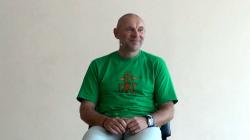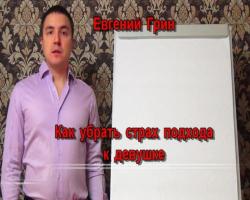Online psychology lessons. General psychology

Format: HDRip, AVC, MPEG4, AAC
Country Russia
Director: Tatyana Chernigovskaya
Genre: lecture
Duration: 04:22:00
Release Year: 2016
Description: Tatyana Vladimirovna Chernigovskaya, professor of St. Petersburg State University, head of the laboratory for cognitive research. His research interests include psycho and neuro-linguistics, cognitive psychology, neuroscience, the origin of the language, the theory of evolution, artificial intelligence, the development and pathology of the language, analytical philosophy. More than 300 scientific works in leading domestic and abroad ...
The psychological trends that follow this line of thought attribute the predominance to the constitutional aspects of the subject, to the detriment of those that are the product of experience, called nativistic trends. Descartes' ideas affect Europe, but soon they are being called into question by philosophical movements that will have their center in France and England. One of his maximum representatives is the Englishman John Locke, who fundamentally attacks Descartes for his concept of "innate ideas." Locke claims that the source of all male ideas is sensory experience.
08
jun
2017
Satsang Big Heart Yu. Menyakhikhin

Translation: Not Required, Subtitles: None
Country Ukraine
Director: Y. Menyakhikhin
Genre: instructional video, satsang
Duration: 01:56:00
Release Year: 2017
Description: Satsang Siddhartha (Yuri Menyakhikhin) in Kiev. (Satsang is a concept in Indian philosophy, meaning: the highest true community, the community of the highest truth; communication with the guru; a gathering of people around an enlightened person, in order to hear the truth, talk about it and assimilate it)
Video: 1280x720 (16: 9), 25.000 fps, MPEG4 / AVC ~ 1029Kbps, 0.045 bit / pixel
Audio: 44.1kHz, AAC 2 ch, ~ 126kbps
Add. Information: m ...
There are simple ideas, such as the idea of \u200b\u200bmovement, 10 bitter, 0 10 sweet, which come from the physical, empirical, observable world. Such ideas are then rebuilt into many configurations. Locke's anoules of knowledge relate to psychology, because it involves awareness, consisting of simple ideas that develop among themselves, forming complex ideas. This causes psychological associativity.
Simple ideas, according to Locke, are those that cannot be shared or analyzed in others. Complex ideas are compositions of simple ideas. In his book, Thoughts on Education, Locke lays the foundations that have governed Western education for many years.
08
jun
2017
How to love yourself easily and quickly. A. Sviyash

Format: HDRip, AVI, MPEG4, AAC
Country Russia
Director: A. Sviyash
Genre: educational video
Duration: 0:59:18
Release year: 2015
Description: Is it possible to quickly change my attitude towards myself? Raise self-esteem, develop confidence, start taking care of yourself? Everything is possible if you go the right way. Conversation is conducted by A. Sviyash about the author Writer, psychologist, president of the American Academy of Success "Reasonable Way", Ph.D., full member of the Professional Psychotherapeutic League, president of the center of positive psychology "Reasonable Way", creator of a unique methodology ...
Prepare them for the difficulties of life. Despite everything, he believes that in schools, physical schools should not be too rigid, since learning should become an experience. pleasant for children. Locke is one of the first to postulate the gradual teaching of complex subjects in schools.
Carlos, our friend Lightning. Other friends. Consciousness is like a hasty river. Ideal ideas continue, according to this 16th geek, from meeting and multiplying to infinity of simple ideas, products, and ultimately the impressions received. This basic principle allows Hume to ask himself: “What is conscience?” What, in the end, is Vo?
20
may
2017
Good always conquers evil. Mirzakarim Norbekov

Format: HDRip, AVI, MPEG4, AAC
Country Russia
Director: Mirzakarim Norbekov
Genre: web conference
Duration: 2:02:31
Release year: 2015
Description: "For me, preparing rich people is not an end in itself. I help to master art and technology to win, to do good, to love and be loved. I do not teach business, I teach to be a Person. To be myself and to be above everything. To become rich, no need to clutch at any activity that will immediately bring income. Work for money sooner or later will bring suffering. And there will definitely come a day when a person simply cannot force himself to be a slave ...
According to Galileo, making psychology a science is "an impossible company." At this historical moment, the scientific nature of psychology is being called into question, mainly due to the ongoing advances in technology and chemistry under the protection of prestigious experimental methods. Paluloku is challenged, for example, because of the impossibility of taking measurements of mental events that they intend to study.
Ernst Weber was the first to achieve this goal. Using a tool like a cornea, try to find out what is the minimum distance that conscience can perceive between the two ends applied to the skin. That is how Weber finds "objectively measuring" consciousness.
20
may
2017
Norbekov. Intuition. Workshop of success.

Format: HDRip, AVI, MPEG4, AAC
Country Russia
Director: Mirzakarim Norbekov
Genre: Training
Duration: 0:53:23
Release Year: 2012
Description: The workshop of success is a unique opportunity to get your secret of success personally from academician Mirzakarim Norbekov. This is a chance to turn life in the direction you need. The ability to realize their hidden talents. Earn your first and subsequent millions, become a member of the Russian Club of Millionaires, the founder of which is Norbekov. About the author Mirzakarim Sanakulovich Norbekov Academician, Doctor of Psychology, Doctor of Philosophy in Copper ...
Weber also examines the magnitude by which the weight of a substance must be increased for the subject to notice differences. The postulate is like! "Weber's Law," which establishes a systematic connection between mind and body. Fechner: the relationship between the physical and mental world.
Gustav Fechner is both a complex and wonderful character. The protesting doctor, exploring the mechanisms that allow the vision of flowers, almost completely loses his sight, because of his experiments. He must add in order to notice the difference: he logically demonstrates a systematic relay between a physical event and a mental event.
04
may
2017
Focus Course VO

Translation: Professional (one-voiced), subtitles: none
Format: HDRip, MKV, MPEG4 / AVC, MP3
Country: USA
Director: Paul Novak
Genre: Video course
Duration: 03:52:33
Release year: 2015
Description: A course on developing the ability to concentrate. Learn how to develop your ability to concentrate on reading, work, study and life. If you find it difficult to stay focused, this course is just for you! Since what a person is concentrating on significantly affects his emotional state, the ability to concentrate on important things and not be distracted by insignificant little things can ...
I need to illuminate the achara with a much more intense light, that is, increase the stimulus. The relationship between body and mind is still a problem for psychologists. Wundt: the birth of scientific psychology. Many of the experiments that have been performed so far do not belong to any field of psychology. Some of them are more details of physics or physiology.
This experiment shows that it takes a tenth of a second to change attention from one thought to another. Wundt is objectively measured. Their classes are very famous, sometimes counting more than two hundred students. These arias mark the heyday of a young science suitable for audacious scholars who agree with the idea that the mind can be mediated.
27
jul
2016
A series of lectures on social psychology (Galina Mikhailovna Andreeva)

Translation: Not Required, Subtitles: None
Format: CamRip, MP4, H.264, AAC
Country Russia
Director: Galina Mikhailovna Andreeva
Duration: 15 x ~ 01:20:00 (\u003d 19: 50: 33)
Release Year: 1995
Cast: Galina Mikhailovna Andreevna Description A series of lectures by a professor at the Faculty of Psychology at Moscow State University M.V. Lomonosova G.M. Andreeva “Social Psychology” Lecture 1: Section 1. INTRODUCTION Topic 1. The place of social psychology in the knowledge system Lecture 2 Topic 2. Milestones in history and social psychology Topic 3. Methodological principles of the study Lecture 3 Section 2. COMMUNICATION AND MUTUAL ...
It seems that a “simple” experiment in psychology comes into play. Psychology is no longer a “branch” of philosophy. This is a science with the subject of its own research, conefesia, which begins to use scientifically based methods. To study simple conscious phenomena, Wundt uses, among other things, introspection. Already San Agustin, trying to search for God inside, or Rene Descartes, in their Metaphysical Thoughts, they re-studied such a method to investigate internal subjective experiences.
But Wundt, according to the experimental trend of the time, uses introspection in a special way. He resorts to laboratory instruments that allow him to precisely control the results of his experiments. In them, for example, he asks subjects to perceive internally certain sensations that are in his mind, which are always accompanied by sensations. This introspection is called experimental introspection. Measurement Experience.
20
jan
2016
Online Coaching: Super Memory

Translation: Not Required, Subtitles: None
Format: DVDRip, MP4, AVC, AAC
Country Russia
Director: Ivan Chursin
Genre: Educational video, psychology
Duration: 04:42:39
Release year: 2013
Description: Super coaching online coaching is designed for all categories of people, as in any area of \u200b\u200bour life we \u200b\u200bconstantly encounter a stream of new information. It is suitable for those who: constantly forget everything the day after exams, but wants to remember everything; wants to get a higher education in just a year and to do this learn to write abstracts using the mind map method and process a lot of literature and ...
Using this type of procedure, one can measure and compare the different reaction times that the subject presents for different stimuli. Historians agree that the first strictly psychological research program appears with Wundt. But although Wundt, firstly, is convinced that this type of experimental research was a good way to scientifically study certain phenomena, he proves that not all so-called psychological processes can be known.
Wundt and "Cultural Psychology" or "Peoples." Despite his experimental vocation, Wundt abandons his studies of reaction time and the study of simple psychological processes, as he warns that mental phenomena, such as language, will, aesthetic and religious feelings, cannot be solved in cold laboratories.
26
may
2015
Easy acquaintance and communication with girls (Alexey Milovanov)

Translation: Not Required, Subtitles: None
Format: CamRip, MP4, AVC, AAC
Country Russia
Director: Alexey Milovanov
Genre: Educational video, pikai
Duration: 02:15:11
Release Year: 2012
Description: There is no Magic Pill. This is our many years of experience and the experience of dozens of seducers, which we packed especially for you in understandable models. These models are what you can work on your own. What you will be able to put into practice tomorrow. This is not a magic pill, but it works. You will also have to practice and gain experience, but much less. If earlier at t ...
For psychology, Darwin allows us to think of man as one of the species of animals that have evolved throughout natural evolution. A person is removed from the absolute and exceptional place in which he was located to place him now in connection with his phylogenetic past, his history and the circumstances of his environment.
While Darwin's theory cannot be extrapolated to a social or psychological level, the concept of “adaptation” is of interest to those who begin to consider human mental activity as a function of adaptation. In this line is a curious character, evolutionist Sir Francis Galton, a cousin of Charles Darwin.
13
may
2015
Conflicts in pair: causes and solutions (Vadim Kurkin)

Translation: Not Required, Subtitles: None
Format: CamRip, MP4, AVC, AAC
Country Russia
Genre: Relationship Psychology
Duration: 02:03:22
Release year: 2015
Description: Psychologist Vadim Kurkin tells why quarrels occur, and gives recommendations on how to maintain peace and harmony in relations, without prejudice to the dignity and interests of each person. Video recording of a live seminar by Vadim Kurkin at the site of the Book Club book club in St. Petersburg ..
Video: 1280x720 (16: 9), 23.976 fps, AVC, 5096 Kbps, 0.231 Bit / (Pixels * Frames)
Audio: 44100 Hz, AAC, 2ch, 192 kbps
Add. Information: Official ...
Galton: the cult of measurement. Interested in measuring the mental ability of individuals, he is the first to group a set of human capabilities under the heading "Intelligence". This enterprise, adding to its conviction that everything that can be measured, is hereditary, defines one of the most controversial, interrogated, and still valid postulates of psychology: 18 the theory of the inherited nature of Integnigel. everything, sir galton is going to carry out statistical research. Galton mediates the length of the weapon.
Their study 10 leads to the conclusion that noble families are more likely to have illustrious offspring, and, as I realized that this ability is inherited, claims that it can improve the intelligence of encouraging the union of brilliant people among themselves, and then discovered the thesis. which advocates "species improvement" through an elective descendant called eugenics, and it will be a "scientific" argument that legitimates years after the killing of millions of people. people during the second world war.
02
apr
2015
How a girl can help her future husband (Alexey Menyailov)

Translation: Not Required, Subtitles: None
Format: WEBRip, AVI, DivX, MP3
Country Russia
Director: Alexey Menyailov
Genre: Educational video, psychology
Duration: 00:16:40
Release year: 2014
Description: Happiness will go only to one who will help her husband. One forgotten, but very effective technique can be considered on the negative example of Romeo and Juliet. So it begs: such an unknown, but scrap technique.
Video: 720x406 (1.77: 1), 30 fps, DivX Codec 4.x ~ 996 kbps avg, 0.11 bit / pixel
Audio: 48 kHz, MPEG Layer 3, 1 ch, ~ 192.00 kbps avg
Add. Information: Partisans ...
In this country, the influence on psychology comes mainly from a psychiatrist. He established the first relationship between hysteria and hypnosis, and, contrary to the opinion of his colleagues, who believed that hysteria “fakes” their symptoms, considers hysteria as a disease of a newborn. Charcot's classes and his patient presentations soon gained international prestige and will be known among young researchers of that time.
Many studies are based on the belief that the proposal may not be effective in improving the condition of patients. Many of them are restless students from all over the world who come to Germany to study, can wundt. One of them is Edward Tlchener. Native English, American-American, German, and German-teaching, lavter decisively affects the fate of American psychology. He found a version of the so-called structural psychology, which is trying to explain how the basic elements of consciousness are combined.
04
feb
2015
16 skills that will change your personal and professional life forever

Translation: Not Required, Subtitles: None
Format: CamRip, MP4, MPEG4, AAC
Country Russia
Director: Vladimir Force
Genre: Educational video, psychology
Duration: 28:35:38
Release year: 2011
Description: 16 skills are 4
Module: Relationships, Unconditional self-confidence, Social dynamics, Effective communicator, each of the modules contains 4 blocks. The advantages of modular-block learning is that the student is not overloaded with a lot of information, receives and hones one skill in one day.
Video: 320x240 (4: 3), 18,000 fps, MPEG-4 Visual (x263), ~ 168 kbps avg, 0.122 bit / pixel ...
This movement is defined as "nominalism." His theory is attentive to the American spirit, focusing on 10 practices and 10 individuals. Functionalists want psychology to become a practical science, and among the research methods they use puzzles, labyrinths and tests.
James: Theory of emotions. It is traditionally believed that emotions are the result of the perception of certain events. For example, in the face of the loss of our condition, the result will be sadness and liorar. According to James, emotions depend on what we do. His theory changes the order of shaking. There is a situation in which angina pectoris causes a bodily reaction, which, in turn, causes emotions.
01
jan
2015
Effective Manipulation: Techniques of Influence and Protection (Igor Pelinsky)

Translation: Not Required, Subtitles: None
Format: SATRip, AVI, DivX, MP3
Country Russia
Director: Igor Pelinsky
Genre: Educational video program
Duration: 00:38:43
Release Year: 2010
Cast: Lead Angelina Sham
Description: As a rule, not being able to manipulate people it is very difficult to achieve what you want. You can not convince the interlocutor? Losing negotiations? Become a victim of someone else's manipulation? Do not listen to your ideas? How to push people to do business? You will get answers to these and many other questions in this film. You will be able to put the acquired knowledge into practice ...
At present, functionalism has lost its innovative character, but its methods and problems remain valid - as its creators will have - in many modern psychological tones. The first is the aorta of Galileo and Copernicus, which displaces a person as the center of the universe. The second, Darwin's evolutionary theory, which establishes that man is no longer a privileged biological creature, as it was before, but comes from anthropoid monkeys.
The third wound to human narcissism comes, according to Freud, from the hands of psychoanalysis and is associated with the discovery of the unconscious. From this discovery, the false illusion of control over one’s own actions falls. Freud comes from the field of medicine. This still confronts him with the problems of other people for the psychology of that time: illness and treatment. Several of the experiences that young Freud went through are crucial in developing his theory. One of them occurs upon repeated receipt. he is going to study Parfs with Jean Martin Charcot. famous french neurologist.
14
oct
2014
How to remove the fear of approaching a girl (Eugene Green)

Translation: Not Required, Subtitles: None
Format: CamRip, WMV, WMV3, WMA
Country Russia
Director: Eugene Green
Genre: Educational video, pickup
Duration: 01:35:37
Release year: 2013
Description: How to remove the fear of approaching a girl? I know deep down you have a fear of approaching a girl. You know this, and I, because the fear of approach used to live in me. It can be expressed in different ways. At one at the sight of a beautiful girl, a complete stupor, breathtaking, everything gets confused in the head, ears and cheeks are red, the other has excuses like "I have no time", "now if she leaves at my stop ...", "if she is off. ..
21
sep
2014
Zen Meditation Training

Translation: Not Required, Subtitles: None
Format: CamRip, AVI, DivX, MP3
Country Russia
Genre: Educational video, psychology
Duration: Zen Meditation Training
Release year: 2013
Description: Zen meditation is a technique of Buddha meditation. It is one of the most widespread meditation in the world and is the heart of Buddhist teaching.
Video: 640x480 (1.33: 1), 23.976 fps, DivX Codec 4.x ~ 259 kbps avg, 0.04 bit / pixel
Audio: 44.100 kHz, MPEG Layer 3, 2 ch, ~ 128.00 kbps avg
Add. Information: Benefits of Zen Meditation Technique: Teaches good concentration and focus; opening ...
In secondary general education and special educational institutions (schools, gymnasiums, lyceums, technical schools, colleges), a lesson is a traditional type of class work. A lesson is a form of organization of activities of a permanent composition of teachers and students in a certain period of time. In this definition (quoted from: Pedagogy, 2002), individual aspects of this rather general concept are reflected. The main characteristics of the lesson is that it is a form of training organization:
groups of students of the same age;
permanent staff;
a lesson on a fixed schedule;
with a uniform training program for all.
The essence of the lesson is “to the collective and individual interaction of the teacher and students, as a result of which students learn knowledge, skills, develop their abilities, work experience, communication and relationships, as well as improve the pedagogical skills of the teacher” (Pedagogy, 2002, p. 327).
From the point of view of the teacher, a lesson is the management of cognitive activity of students. From the student’s point of view, this is the assimilation of scientific, practical and social experience and development. The function of the lesson is to achieve certain, relatively completed, goals on the path to cognition and development. Goals are the intended, pre-planned results of activities. The lesson contributes to the achievement of certain didactic goals, the solution of specific tasks in each individual time period of the educational process. Features of the lesson as an organizational form of learning are determined by its goals and objectives.
A typical lesson involves the following forms of academic work and the solution of the corresponding didactic problems:
checking homework and repeating the completed;
explanation of new teaching material;
consolidation and application of new material.
The sequence of solving these didactic problems may be different. The traditional plan of the combined lesson includes the following points:
organizational moment;
checking homework;
a survey of students on previously passed material;
study of new material;
fixing it;
homework.
126 Chapter 6. Organization of training and types of training sessions in psychology
However, there is no need to always strictly adhere to this sequence in planning the lesson. A flexible and varied approach to the structure of the lesson eliminates the stereotypical nature of the lesson. Elements of the structure of the lesson can be various activities of the teacher and students.
The methodological substructure of the lesson, developed by the teacher on the basis of the didactic structure, is characterized by a large lesson in the psychology of variability:
in one lesson, it can include a teacher’s story, raising questions for students to reproduce the information communicated by them, performing exercises according to the model, solving problems, etc .;
on the other - a demonstration of the ways of activity, their reproduction by students, solving problems using the same method in new, non-standard situations, etc .;
on the third - the solution of search problems, with the help of which new knowledge is acquired, generalizations of the teacher, etc. (Pedagogy, 2002, pp. 333-334).
Types of lessons.In modern didactics, there are several approaches to classifying lessons, each of which has a defining attribute. Let us dwell on one of them, the most generalized. Makhmutov proposes to classify the lessons according to the purpose of the organization, determined by the general didactic goal, the nature of the content of the material studied and the level of preparedness of students. In accordance with this approach, five types of lessons are distinguished (Makhmutov, 1985).
Lessons learning new material.The purpose of this type of lesson is to master students with new material by explaining new material to the teacher, streamlining and consolidating previously learned. It is impossible to study new material without recalling material already passed, without relying on it and not applying it. Forms of studying new material can be:
teacher’s explanation involving students to discuss specific issues;
heuristic conversation;
independent work with the textbook and other sources;
setting up and conducting experiments and experiments.
Within the framework of this type, teachers can apply such types of lessons as:
lesson lecture;
workshop lesson;
film lesson;
lesson of theoretical and practical independent work;
mixed lesson (a combination of different types of lesson in one lesson) (cited from: Pedagogy, 2002, p. 336-337).
6.5. Psychology lesson 127
Lessons to improve knowledge, skills.The main didactic tasks that are solved in these lessons are as follows:
♦ systematization and generalization of new knowledge;
repetition and consolidation of previously acquired knowledge;
putting knowledge into practice to deepen and expand previously acquired knowledge;
skill building andskills;
monitoring the progress of the study of educational material and improving knowledge, skills and abilities (Pedagogy, 2002, p. 337).
In this type of lessons, several subtypes are distinguished: lessons of consolidation of the studied material, lessons of repetition, lessons of the integrated application of knowledge, skills.
The main types of lessons of this type include:
independent work lessons (of the reproductive type - oral and written exercises);
lesson laboratory work;
lesson of practical work;
tour lesson;
lesson-seminar (Pedagogy, 2002, p. 337).
Lessons of generalization and systematization.Such lessons stimulate students to repeat large sections and blocks of educational material, allow them to realize its systemic nature. The lessons of generalization and systematization provide for all the main types of lessons.
Combined lessons.This is the most common type of lesson in existing school practice. It solves various didactic problems from the number considered above, so this type of lesson was called "combined". The methodological structure of such a lesson includes the following main elements:
organization of students at the beginning of the lesson;
repetition and testing of students' knowledge, identifying the depth of understanding and degree of strength of everything studied in previous classes and updating the necessary knowledge and methods of activity for subsequent work on understanding the newly learned material in the current lesson;
introduction of new material by the teacher and organization of students' work on its comprehension and assimilation;
primary consolidation of new material and organization of work to develop skills in students to put knowledge into practice;
formulation of homework and instruction on its implementation;
summing up the lesson.
128 Chapter 6. Organization of training and types of training sessions in psychology
The listed components of the methodological substructure of the combined lesson interact with each other and often pass into each other; they can change the sequence depending on the organization of the cognitive process. In such cases, the structure of the combined lesson becomes flexible, mobile (Pedagogy, 2002, p. 339-340).
Lessons control and correction of knowledge, skills.Lessons of this type are designed to assess the results of learning, the level of students learning the material, diagnosing the level of student learning, correction in the learning process. Such lessons may take the following form:
oral survey (frontal, individual, group);
written survey;
dictations;
statements;
problem solving;
test work;
control independent work;
These types of lessons are held after studying the volume sections and topics of the training course.
After conducting control lessons, a special lesson (or part of the lesson) is conducted to analyze and explain typical mistakes, advantages and disadvantages in the knowledge, skills and abilities of students.
Preparing a teacher for psychology lessons is:
in the selection of information material for use in the lesson;
in highlighting the basic facts, phenomena, concepts, laws that make up the knowledge that should be learned by students;
in choosing ways to explain this knowledge;
in the selection of examples and illustrations for concepts and patterns;
in the development of types of practical activity aimed at the assimilation and consolidation of knowledge;
in the development of developing types of student activity;
in the distribution of tasks for classroom and independent work.
The most important task in preparing for a lesson in psychology should be the selection and formulation of knowledge, which will be the subject of study:
regular relationships of mental phenomena;
psychological facts.
mental phenomena;
It is impractical to saturate the lesson with a large number of concepts, facts, patterns. It is much more important to ensure understanding of the new material and its consolidation in practice, to show the possibilities of practical application of the acquired knowledge.
6.5. Psychology lesson 129
As sources in preparing for the lessons, those textbooks, scientific and non-fiction books that are listed in the program are used. In addition, articles in scientific and popular science journals (which are usually not indicated in the program) can also be used.
When preparing for psychology lessons at a school, we can take textbooks and teaching aids published in our country for schools (Kolominsky, 1986; Nemov, 1995; Klimov, 1997; Rean, Gatanov and Baranov, 2000), for elementary schools - educational manual edited by I.V.Dubrovina (1998). In addition, textbooks for junior high schools can also be used as teaching aids (Godfroix, 1996; Introduction to Psychology, 1997; Maklakov, 2001).
Sometimes teachers are at a loss in choosing one study guide, which from their point of view would be most suitable for students. Therefore, in preparation for the lessons, it is possible to combine materials from different books.
The above manuals have the undoubted advantage that they systematically present psychological knowledge. However, the completeness and accessibility of the presentation of individual issues in them is not the same. Therefore, many teachers use them selectively.
In addition to teaching aids, in preparation for lessons, you can use non-fiction books and articles in popular science magazines and newspapers. They are written in an accessible language and are accompanied by examples. Therefore, they are convenient to use in preparing for lessons. Interesting and useful materials on psychology are published from time to time in such magazines as Science and Life, Knowledge is Power, and Health; the heading “Psychologist at the blackboard” is in the newspaper School Psychologist.
There are a lot of popular science publications in psychology. Most of them are devoted to a certain area of \u200b\u200bpsychology, so the names of specific books useful in preparing for lessons will be given in the relevant sections.
Books and articles on psychology for children and youth may be most useful, since they are already adapted for the corresponding age category. We will list the titles of books on relevant topics below when considering individual topics.
Scientific publications and articles in scientific journals provide a description of scientific research, intended, as a rule, for specialists. You can find the latest scientific data in them, however, when preparing for the lessons, the teacher needs to present this material in a didactically accessible form for students of the corresponding level of training. The most famous scientific journals on psychology in our country: “Questions of Psychology”, “Psychological Journal”, “Bulletin of Moscow University Series 14, Psychology”. In recent years, the journals Foreign Psychology, Psychological Review, The World of Psychology, Children's Practical Psychologist, and the Journal of Practical Psychologist began to appear. From time to time, articles are published in them that are useful and interesting not only for professional psychologists, but also for teachers.
As a result of such preparatory work, a lesson summary is developed, which is a concise, coherent presentation of the content of the educational material that the teacher teaches students and the types of activities that are used in this case.
130 Chapter 6. Organization of training and types of training sessions in psychology
Summary of the lesson.The appearance of the outline of a lesson in psychology may be different, but in any case it should include:
wording of the topic;
description of the goals and objectives of the lesson;
listing the main stages of the lesson;
a brief description of the content and activities of the teacher and students at each stage of the lesson;
description of visual aids and methods of their use in the lesson;
indication of the estimated time that the individual fragments of the lesson will take according to the teacher.
The most important sign of a good abstract is the possibility of its practical use for the lesson. For this, he should be readable enough in any conditions of the lesson, at any location of the teacher in the classroom. The summary should be for the teacher a clear and concise guide to the lesson and help in its implementation.
Organization of educational activities of students in the lesson:In pedagogical literature and school practice, there are three main forms of educational activity:
frontalwhich involves the joint actions of all students in the class under the guidance of a teacher;
individualwhich involves the independent work of each student individually;
groupwhich involves the work of students in subgroups of 3-6 people or in pairs; assignments for groups can be the same or different (Pedagogy, 2002, p. 344-354).
When organizing and conducting psychology lessons, it is necessary to take into account a number of psychological and pedagogical principles of training. In particular, it is important to control the attention of students in the lesson, its sustainability and switching. Maintaining a high level of attention for a long time is a difficult task for most children. As practice shows, from time to time there is a decrease in attention, which is often called a crisis of attention. The frequency of crises depends on the age of the students and the degree of interest in the study material; usually a crisis occurs approximately every 15 minutes. At these moments, it is advisable for the teacher to activate involuntary attention, switch the attention of students to new types of activity.
Since the study of psychology at school is primarily of educational importance, special attention must be paid to planning lesson-developing activities of students. As developing tasks, tasks can be used for mastering the means of understanding other people and self-knowledge, for mastering effective techniques of intellectual work (development of observation, mnemonics, mental operations and strategies for solving problems), for mastering methods of mental self-regulation (relaxation, auto-training).
6.6. The study of literature, preparing students for classes in psychology 131
Homework in psychology should be creative and not create additional training overloads. The main emphasis in the study of psychology is advisable to do in classroom.
In conclusion, we note that in the literature on psychology the concept of "lesson" sometimes denotes different types of occupations: both subject-oriented and personality-oriented. In this section, we examined mainly the organization of subject-oriented psychology lessons. Lessons of a personality-oriented type in terms of activity and methodology are more likely to be extracurricular activities. The methodological aspects of their planning and organization are similar to psychological trainings.

